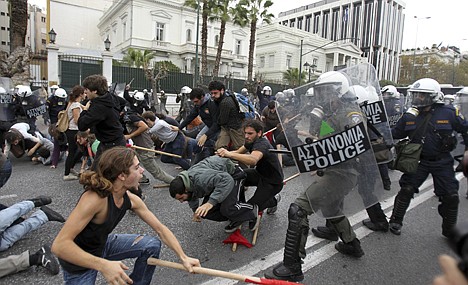EU leaders bid farewell to euro's horrible year
BRUSSELS (AP) - European Union leaders capped the euro's year of pain with renewed resolve to protect their battered common currency. But even after their seventh summit in a chaotic year, markets failed to take heed, leaving the leaders baffled. Again.
After dark Thursday, the government leaders vowed to use all their financial might to protect troubled member states. Before dawn Friday, a major ratings agency downgraded the creditworthiness of a troubled EU economy - Ireland - paying scant attention to all their pledges and promises.
Thus was the year in Europe, when the euro, meant to weld former foes together forever, fell prey to a market that saw debt, deficit and outrageous spending where governments saw political ideals.
Throughout 2010, markets have all too often seen government as a step behind events - and been seen by leaders as reacting beyond reason.
"It is excessive, if I may say so," Irish Prime Minister Brian Cowen said, arguing his drastic budget cuts to rein in a runaway deficit deserved better.
Yet, Ireland's damage was already done.
"It's always too little, too late," Professor Paul de Grauwe of Leuven University said of the EU's reaction to the year-long crisis. "They've waited too long to give a message to the market."
In the latest attempt to keep the eurozone of 16 nations unraveling further, EU leaders decided Thursday at their last meeting of the year to change the treaty that underpins the bloc to make room for a new rescue system for countries that get into debt trouble in the long term.
And Sarkozy and German Chancellor Angela Merkel joined forces on Friday in announcing plans to reduce the huge differences among the euro economies that market players exploited all year long.
That will likely mean a bigger attachment to tough EU standards in economic policy, social policy and possibly taxation - areas that member states have long tried to keep in national capitals and out of the common EU realm.
"This year has definitely pulled us closer together than we would have expected two or three years ago," Merkel said Friday.
But certainly not in the way any would have expected.
Greece started the crisis off, with the revelation late last year that it had been fudging its statistics to mask a massive deficit and debt. And after giving up the German mark, French franc and Italian lira a dozen years ago, many European taxpayers were livid they had allowed the Greek drachma to poison the common currency.
Markets pounced on the perceived weakness of the euro, a currency that's become a standard-bearer along with the dollar and the Japanese yen on international market.
Some charge that the Greek government and the EU didn't match the market speed in reaction, and governments are still trying to catch up.
"The market can react by computer in a fraction of a second in the interest of profit, sometimes speculation. it has nothing to do with the building of Europe where 27 nations have to agree," Sarkozy said.
Improvising as they went along, some finance ministers like France's Christine Lagarde even acknowledged panic in the dead of night on May 9 just before the EU joined the International Monetary Fund to pledge nearly $1 trillion to backstop financially troubled euro members.
The sheer size of the fund was thought to be sufficient to repel any more financial speculation.
"We shall defend the euro whatever it takes," EU Monetary Affairs Commissioner Olli Rehn said at the time, a mantra repeated at every summit since. But markets kept on pounding Portugal, Ireland, Italy, Greece and Spain - which entered the collective consciousness as the PIIGS countries.
"The heads of state and government of the eurozone stand ready to do whatever is required to ensure the stability of the eurozone as a whole," EU President Herman Van Rompuy said at the year's last summit, which ended Friday.
All eyes were not on him, however - but on the financial charts of weak member nations and how much interest they will have to pay on their loans.
It was a year when the European public at large learned about concepts like growing bond spreads, which highlight the lack of trust in a nation's economy. And then that public went out do battle on the streets over austerity measures imposed on their families. Three people died in Athens in a fire set by demonstrators.
In July, governments "stress-tested" their banks to see if they would resist further attack. The Irish banks passed the test - only to later become the major source of Cowen's problems. In November, Ireland needed massive EU help to stave off default.
Safeguarding the euro though, is well worth fighting for, Sarkozy said.
"The euro is at the heart of Europe. If the euro crumbles, it is Europe which is fundamentally hurt," Sarkozy said.
"If the euro fails, it is Europe which will explode. So the euro will not collapse."

